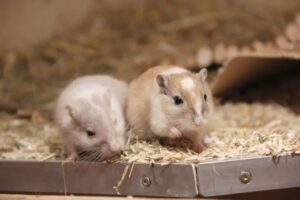Decoding Gerbil Sounds: Understanding Their Meanings with Audio Samples


Gerbils are social creatures like us; this means that they have developed various vocalizations to communicate among themselves and with humans; since gerbils can form close bonds with their human owners, these vocalizations may even be used to communicate directly with you!
Gerbils often produce noise as an indication of how they’re feeling or in response to stimuli in their environment.
Beside vocalizations, it is also beneficial to watch their body language and actions to gain a clearer picture of what your gerbil is trying to communicate. Age and sex also play an important role in what type of sounds gerbils make.
Understanding the different sounds gerbils make can help you create a stronger bond with your pet.
Here are a few of the more commonly heard sounds made by gerbils and their meaning.
Divider-RabbitPaw1
The most typical sound gerbils make is chirping, and this may become familiar to you over time. At its heart, this noise signals their need for attention; so they typically begin doing this early on to gain their mother’s interest. Chirping typically falls somewhere in between loud and quiet volumes and they may make this noise once or repeatedly throughout their lives.
Though chirping is typically associated with young gerbils, adult ones will also engage in this behavior occasionally. The tone of their chirp can differ depending on its context; playful chirping will sound differently than when fighting; similarly a youngster calling out for its mother will differ greatly from an adult that needs assistance.






